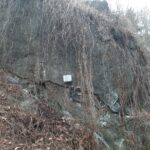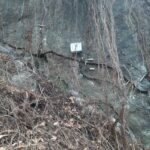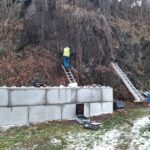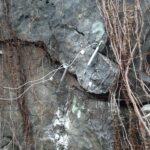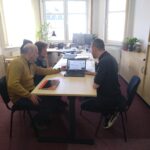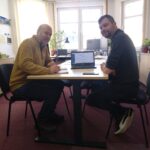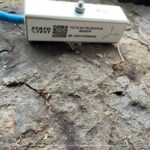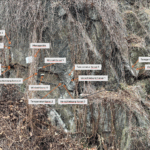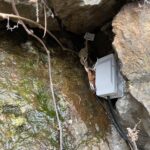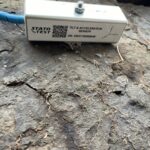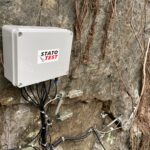EDIH Feasibility Study
What is EDIH Saxony?
EDIH Saxony is a European Digital Innovation Hub focused on supporting digital transformation and innovation in the Saxony region. Its goal is to provide expertise, technology, and financial support for projects that contribute to the development of digital infrastructure and innovative solutions.
What is the aim of the feasibility study?
The aim of the feasibility study is to evaluate the potential cost savings and benefits to public safety. The study involves testing the Statotest monitoring system in the environment of municipal property and infrastructure management and comparing it with already used technologies. The project focuses on defining expected outcomes and collaboration details using agile methods.
Pilot Project: Practical Tests of Online Monitoring Systems for Geological Changes and Potential Rock Falls
Project Overview: The collaboration between the Stadtverwaltung Gemeinde Zwönitz and Statotest s.r.o. aims to enhance public safety and optimize maintenance planning through practical tests of online monitoring systems for geological changes and potential rock falls. This innovative project leverages advanced technology to provide real-time data and predictive insights, ensuring the stability and safety of various structures.
Project Partners:
- Stadtverwaltung Gemeinde Elterein/Zwönitz: Located in the federal state of Saxony, Germany, this municipal administration is committed to the pilot project with the goal of improving public safety and urban infrastructure management.
- Statotest s.r.o.: A tech start-up based in Liberec, Czech Republic, Statotest specializes in developing monitoring systems for infrastructure objects such as bridges, masts, and retaining walls. Established in 2020, Statotest has numerous applications in place across the Czech Republic and beyond.
Project Location: Rock formation “Kleiner Anger” in the municipality of Elterein, Saxony.
Technology and Implementation: Statotest’s comprehensive monitoring system utilizes artificial intelligence to predict future trends and provide instant warnings. The system measures and records physical quantities indicating the current state of structures, aiding in repairs and maintenance planning. Key features include:
- Hardware: Sensors collecting relevant values on constructions, developed for efficient customer use.
- Software: Cloud-based platform for data gathering, processing, and display, tailored to customer needs.
Project Goals: The project aims to:
- Test the practical suitability and advantages of stability (geo-)monitoring systems.
- Evaluate the potential cost savings and benefits to public safety.
- Introduce agile methods and startup culture to existing institutions.
- Foster an innovative and collaborative mindset within the municipal administration.
Project Plan: The collaboration begins with an initial workshop to define project details using agile methods. The implementation phase involves testing the Statotest monitoring system in the municipal administration environment with various hardware configurations based on the construction’s digitalization level. The project includes:
- Measurements: Tilt, vibrations, temperatures, humidity, and precise position (segment displacement), ice sensor.
- Devices: Statobox Safebox, external accelerometers, dilatometers.
Project Timeline:
- Initial Meeting: January 23, 2025
- Installation of Pilot Technology: January 30, 2025
- First Evaluation Meeting: April 2025
- Final Evaluation Meeting: May/June 2025
Objective: This collaboration not only enhances public and private property safety but also promotes innovation and efficient infrastructure management. By adopting Statotest’s advanced monitoring systems, the Stadtverwaltung Gemeinde Zwönitz can ensure the stability and safety of various structures, ultimately benefiting the entire community. This pilot project aims to verify this assumption in real-world conditions.
The project ran until the 30th of June. On the 1st of July, all parties took part in the final meeting. The participants were:
Michal Resl, Statotest
Ute Hahn, Town administration Elterlein/Zwönitz
Marco Ludwig, Town administration/Zwönitz
Willy Eckart, engineering office Eckart
The project achieved its aims: the municipality tested the use of a modern online technology for property administration. The responsible employees gained online an overview of the behaviour of the monitored rock. Inhabitants benefited from improved safety thanks to the online monitoring of potential rockfalls.
Agile methods were used to define the project objectives, create the monitoring design, determine the approach for installing the sensors, working with the Statotest online cloud portal, the gathered data – as well as interpreting the meaning of the data.
The data gathered by the Statotest system was compared to classical methods of measuring changes in the rock mass. According to Mr. Eckart from the engineering and geodetic office Eckart, the results were “very good, as they are plausible and both data sets (Statotest and classical measurements) align well and reflect the expected trend based on experience with this location and known behaviour of such rock under these conditions.”
According to Marco Ludwig from the Elterlein/Zwönitz administration, “the system is very useful as it improves the efficiency of municipal operations: it delivers high-quality results (at the same resolution as classical methods), but is available in real time and accessible online – eliminating the need for site visits“.
All parties (the town administration, the engineering office, and Statotest) have a strong interest in continuing the cooperation, as the feasibility study demonstrated clear benefits – not only for the administration, but also for the engineering office, which is now considering using such technologies in its future projects for towns and cities.
The monitoring of the rock “Kleiner Anger” will continue to collect data over the winter period.
Project KPIs
- Training Sessions and Workshops: Number of sessions: 2
- We had the opening workshop to defined the cooperation and the middle term workshop to discusse experience and refine the settings, final workshop toke place online
- Trained Individuals: Number of persons trained: 4
- Communication Outreach: Persons reached: 10
- Including the inhabitants of the town and owners of the neighbouring property
- Tested Scenarios: Number of scenarios tested: 2
- The setting enable to test even more scenarios under different weather conditions
- Online Communication Workshops: Number of workshops: 3
- We had several workshops to talk about the experience and discuss possible settings.



